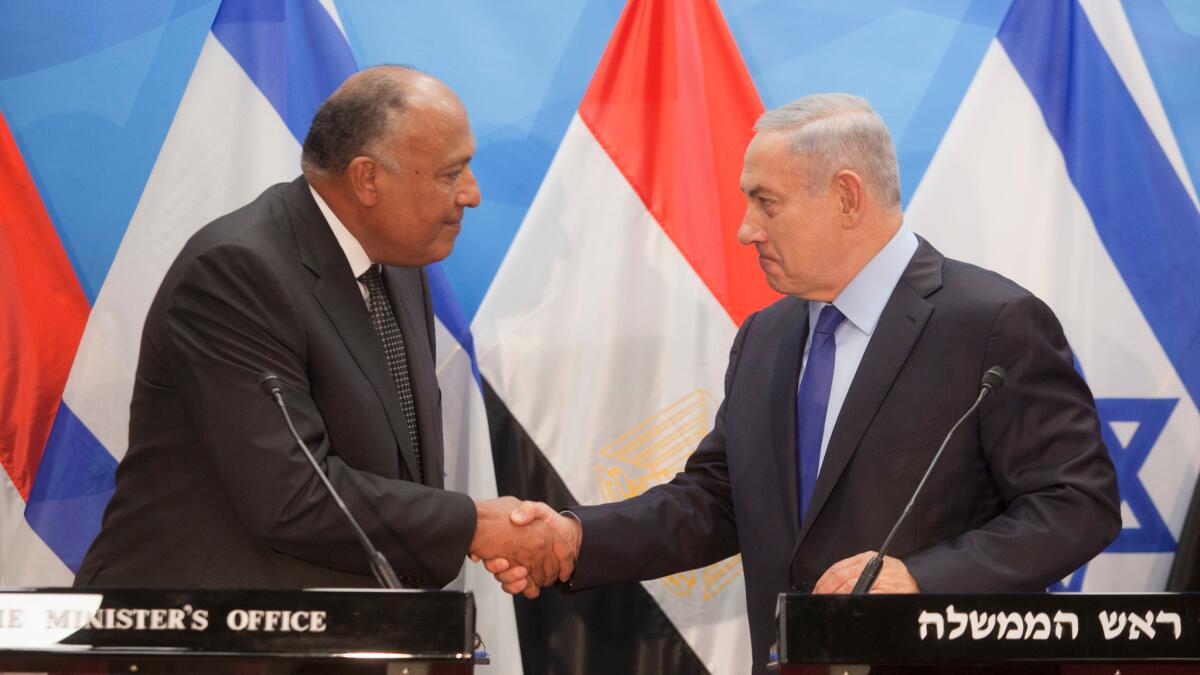Egypt wants to revive the Israeli-Palestinian peace process

- Share via
Reporting from Tel Aviv — Egypt’s foreign minister made a surprise visit to Israel on Sunday, the first official trip in nearly a decade. The gesture reflects Cairo’s desire to reassert itself as a regional broker by attempting to revive the Israeli-Palestinian peace process.
For years, the two countries have remained discreet about their close military ties to avoid aggravating public opinion in Egypt, which opposes normalized relations despite a 37-year-old peace treaty.
Egyptian Foreign Minister Sameh Shoukry said the trip reflects Cario’s “long-standing responsibility” to promoting a two-state solution, and cautioned Israelis that their 49-year-old military occupation of the West Bank is “neither stable nor sustainable.’’
“Ever since the cessation of negotiations between the Palestinian and Israeli sides in April 2014, the situation on the ground has been in constant deterioration,’’ he said before a work meeting with Israeli Prime Minister Benjamin Netanyahu. “It is no longer acceptable to claim that the status quo is the most that we can achieve.’’
Shoukry’s visit comes a week after he met with Palestinian leadership in the West Bank city of Ramallah, and nearly two months after Egyptian President Abdel Fattah Sisi made a public appeal to Israelis on the peace process. Sisi promised warmer bilateral ties if progress was made on restarting peace talks that would establish a Palestinian state alongside Israel.
The summit provided some positive optics for Netanyahu, whose right-wing administration has faced growing criticism from Europe and the United States over the stalled peace negotiations and Israel’s continued expansion of settlements in the West Bank.
Netanyahu vehemently rejected a French-sponsored Middle East peace initiative launched in June as an undesired intervention. He has instead talked about pursing an Israeli Palestinian peace through regional agreements between Israel and its Arab neighbors.
Welcoming greater Egyptian involvement, Netanyahu said that strong Israeli-Egyptian ties are “cornerstones” of “a broader regional peace and a broader stability we hope to achieve.’’
The Palestinian Authority has encouraged the Egyptians to help broker confidence-building measures, said an official who requested anonymity because he was not authorized to speak publicly on the matter.
After years of domestic upheaval in Egypt following the 2011 “Arab Spring,” Sisi is trying to reestablish the mediating role that former President Hosni Mubarak once played before he was forced to resign, analysts said.
The unrest in Egypt severely strained bilateral ties with Israel: A supply agreement to export natural gas from Egypt to Israel fell apart; a militant attack from Sinai into southern Israel left Israelis and Egyptians dead; and an Egyptian mob broke into the Israeli Embassy, forcing an emergency evacuation of Israeli staff.
In recent years, ties have been improving: Egypt has shut down smuggling tunnels into Gaza that support the Palestinian territory’s Hamas rulers – a move that Israeli leaders had long called for. The sides are now discussing a possible deal export gas to Egypt. There’s also coordination against Islamic State groups that are based in the Sinai.
“This is a very important visit,’’ said Oded Eran, a former Israeli ambassador to Jordan. “The peace process is the key issue for the Egyptians. They are sophisticated enough to understand that both Israelis and Palestinians are either unwilling or unable to proceed toward a comprehensive solution. But for the Egyptians, it’s important because they are going back to their role as a regional leader. For Israel it’s important because it shows the willingness to cooperate on a regional level on a regional solution to the Israeli Palestinian conflict.”
Eran added that Egypt would also like to play a role in reconciling the 9-year-old internal Palestinian split between Abbas’ Palestinian Authority, which controls the West Bank, and Hamas, which controls the Gaza Strip.
Israel’s recent reconciliation agreement with Turkey highlighted that the Israeli-Palestinian conflict continues to have geopolitical significance even if there are no peace talks on the horizon, said H.A. Hellyer, a senior nonresident fellow at the Atlantic Council’s Center for the Middle East. “Cairo has a strategic interest in ensuring it is perceived internationally as being indispensable to the resolution,” he said.
Still, given that a majority of Netanyahu’s Cabinet and his own Likud party oppose a Palestinian state -- and in light of the declining popularity of Palestinian Authority President Mahmoud Abbas -- it’s unclear whether Egypt can succeed where the United States and Europe have so far failed.
Elie Podeh, a professor of Middle Eastern studies at Hebrew University in Jerusalem, said that Shoukry may be trying to soften Israel’s resistance to the French sponsored peace initiative.
“There is an opportunity to advance something,’’ he said. “The visit is one more step on the road to somewhere.”
More to Read
Sign up for Essential California
The most important California stories and recommendations in your inbox every morning.
You may occasionally receive promotional content from the Los Angeles Times.










